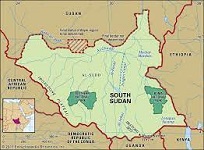The International Fund for Agricultural Development (IFAD) is set to provide funding to assist 23,900 vulnerable rural people (4,780 households) in the Republic of South Sudan.
The IFAD grant will help reduce the impact of the COVID-19 pandemic on their farming activities and safeguard their livelihoods. South Sudan is the youngest African nation and the third most fragile nation in the world.
Food availability and access remain a challenge for most of the population due to the country’s prolonged conflict, disruption of agricultural value chains and displacement of people. The COVID-19 pandemic therefore poses a serious threat to an already fragile situation, especially in regard to food and nutrition security.
Through its Rural Poor Stimulus Facility (RPSF), IFAD will provide US$706,000 to support the Resilient Livelihood and Food System project, which will help small-scale producers in Bor and Torit counties improve their agricultural productivity by ensuring timely access to inputs and post-harvest technologies.
The project will distribute a combined total of 52 metric tons of seeds for maize, sorghum, groundnuts and select vegetables at the beginning of the planting season. In addition, fisherfolk will receive kits consisting of hooks, nets and spools of twine. Farmers will also receive training on production technologies that will enable them not only to resume their usual activities but also take up new opportunities made available through the project.
“This grant to South Sudan is a demonstration of IFAD’s commitment to support post-conflict countries under the framework of the humanitarian – development – peace nexus, and to safeguard food security by ensuring small-scale farmers continue their farming activities and build their resilience to external shocks,” said Bernadette Mukonyora, IFAD Country Director for South Sudan.
Due to inadequate storage infrastructure in the country, much food is lost before it ever reaches markets–farmers lose about 15 to 50 per cent of their produce. The project will make available post-harvest equipment such as threshers, silos, hermatic bags, refrigeration and coolers. In addition, farmers will receive training on production technologies and post-harvest handling practices to enable them to safeguard their harvest during the COVID-19 pandemic and secure their food security.
The project will be implemented under the supervision of the Ministry of Agriculture and Food Security with the technical assistance of Vétérinaires Sans Frontières Germany. At least 50 per cent of the beneficiaries will be women and 50 per cent young people.
Since the country’s independence, IFAD has financed one rural development programme in South Sudan at a total cost of US$25.9 million, with an IFAD investment of US$13.5 million. The programme has directly benefited 76,800 rural households in South Sudan.

